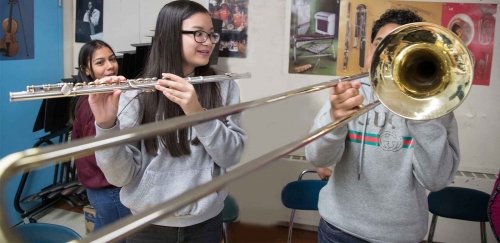Why or in what ways is writing important to your discipline/field/ profession?
The ability to write well is important for all students seeking a career in music. Performers, music educators, musicologists and composers are required to write resumes, cover letters, grant applications and program notes. Music educators must also be adept at creating lesson plans, student assessments and learning outcomes. Musicologists and theoreticians will use their writing skills to produce scholarly research papers, magazine articles, and books. Music administrators are required to create websites, write copy for promotional materials, create grant applications and write to benefactors in order to solicit donations. Music critics will need sufficient writing skills to compose performance reviews and written interviews with prominent figures in the field of music.
Which courses are designated as satisfying the (Writing in the Discipline) WID requirement by your department? Why these courses?
The music area within the Department of Music, Theatre, and Dance has designated the courses listed below as satisfying the WID requirement.
- MUS 205: Music History and Literature I (all music degree programs)
- MUS 206: Music History and Literature II (all music degree programs)
- MUS 391: Junior Recital-Music Performance Majors
- MUS 492: Senior Recital-Music Education Majors
- MUS 493: Senior Recital-Music Performance Majors
- PFA 461: Senior Seminar (Music BA only)
These specific courses have been designated as WID classes due to the fact that they teach and require various types of writing skills which are critical for music majors.
What forms or genres of writing will students learn and practice in your department’s WID courses? Why these genres?
A number of writing genres are introduced and developed in the music area WID courses.
In MUS 205: Music History and Literature I students are required to write about interpretive approaches toward music of the past by listening to multiple recordings of the same piece of music and writing a comparative analysis in the form of an essay. This course also requires a stylistic analysis and two research papers on topics related to music history. In addition to course materials, students must consult at least three outside sources of scholarly merit.
In MUS 206: Music History and Literature II students continue to refine the materials and methods of written discourse in the field of music, in part, by focusing on the integration of primary sources into the writing process.
Another important requirement is learning forms of writing associated with the concert experience such as concerts reviews and program notes. MUS 391: Junior Recital, MUS 492: Senior Recital-Music Education Majors, and MUS 493: Senior Recital- Music Performance Majors all require students to write press releases, promotional materials, a recital program and program notes.
In PFA 461: Senior Seminar students develop individual projects by either 1) completing a research paper on a topic in music history, literature or ethnomusicology, 2) completing an in-depth analytical essay on a topic in music theory or music criticism, or 3) presenting a lecture-recital with a supplementary written component such as a research-oriented term paper.
What kinds of teaching practices will students encounter in your department’s WID courses?
There are a few modes of writing instruction in the music area WID courses. In MUS 205 and 206 students submit a topic, an outline, and a rough draft to the instructor for feedback. MUS 391, 492 and 493 typically involve regular one-on-one meetings between student and instructor to discuss the works-in-progress. PFA 461 involves both of these modes of instructions as well as presenting works-in-progress to classmates for feedback and discussion.
When they’ve satisfied your department’s WID requirement, what should students know and be able to do with writing?
Students who have completed the WID requirement should be able to do the following:
- effectively market themselves to a prospective employer or funding source
- critically review musical performances and recordings in an effective and coherent manner
- analyze musical works from a theoretical, aesthetic, and historical perspective
- write coherent and effective research papers on all topics related to music history, music theory, musical performance practice, and musical biographies


